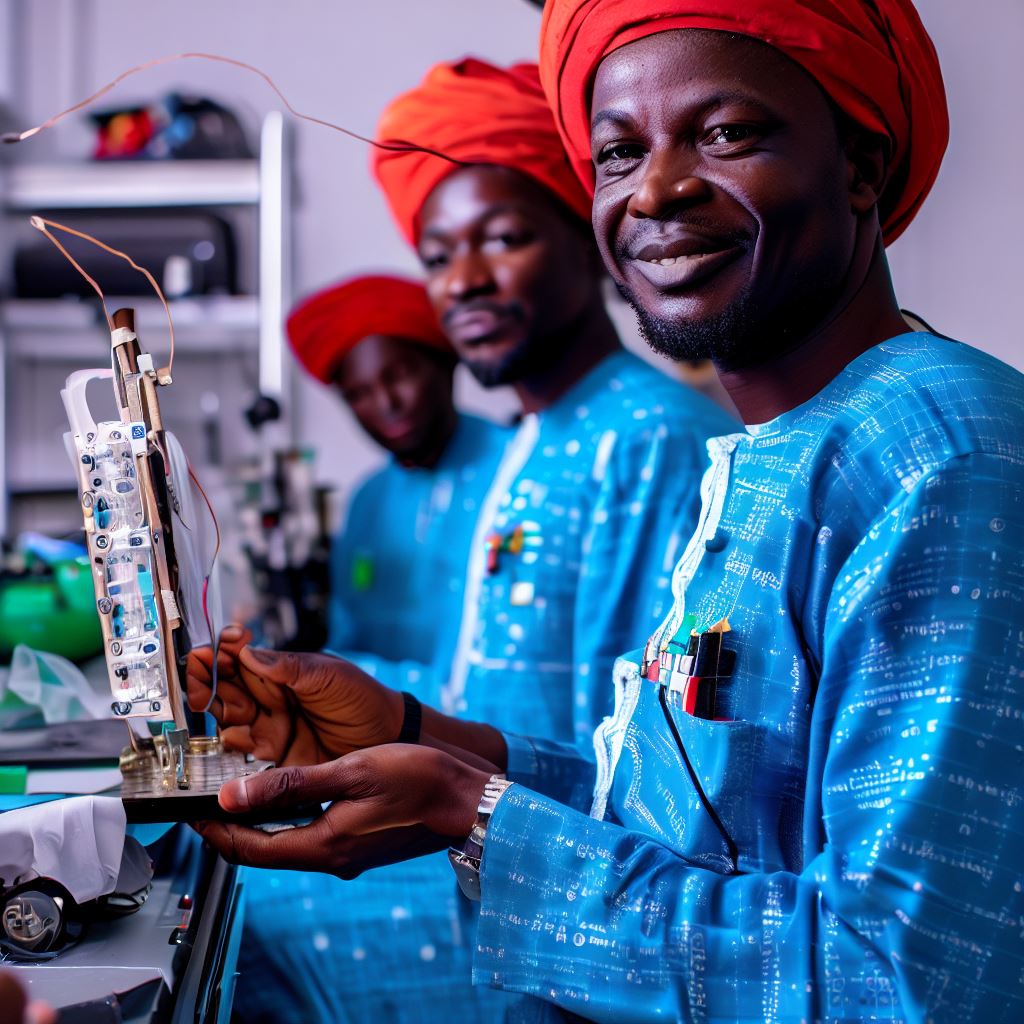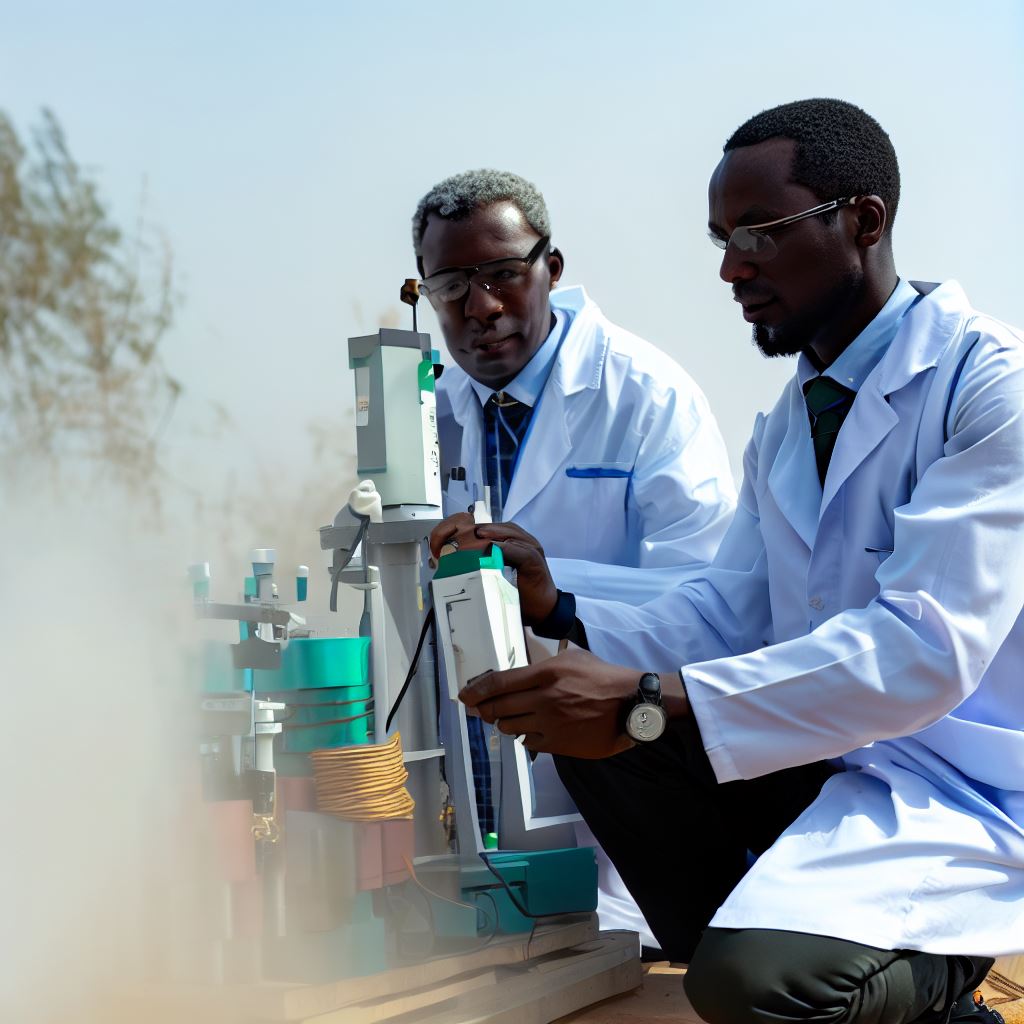Introduction
Space programs play a crucial role in the development and progress of a country.
They enable nations to explore and utilize outer space for various scientific, economic, and strategic purposes.
Nigeria, as a country, recognizes the importance of space programs and has made significant strides in this field.
Space programs offer numerous benefits to a nation. They enhance scientific research capabilities, allowing scientists to study and understand celestial objects, the Earth, and its environment.
Additionally, these programs contribute to national security, as they enable the monitoring of potential threats and assist in disaster management.
Nigeria’s space programs have come a long way since their inception.
The National Space Research and Development Agency (NASRDA) was established in 1999 to oversee the country’s activities in space technology and research.
One of the key milestones was the deployment of Nigeria’s first satellite, NigeriaSat-1, in 2003.
Since then, Nigeria launched more satellites like NigeriaSat-2 and NigeriaSat-X, offering valuable data for agriculture, disaster management, climate studies, and urban planning.
Furthermore, Nigeria has collaborated with international partners, such as China, to develop its space capabilities.
This collaboration has led to the successful launch of Nigeria’s first communication satellite, NigComSat-1R, in 2011.
Nigeria invests in space programs for economic development, telecom infrastructure enhancement, and bolstered national security.
These endeavors highlight Nigeria’s commitment to utilizing space programs for the benefit of its citizens and the overall progress of the nation.
History of Nigeria’s space programs
The history of Nigeria’s space programs dates back several decades. In 1960, Nigeria gained independence from British colonial rule.
A. Establishment of the National Space Research and Development Agency (NASRDA)
However, it was not until 2001 that Nigeria established the National Space Research and Development Agency (NASRDA).
The establishment of NASRDA marked a significant milestone for Nigeria’s space exploration efforts.
One of the notable achievements of NASRDA was the launch of NigeriaSat-1 in 2003.
This was Nigeria’s first satellite and it was designed for remote sensing purposes.
B. Launch of NigeriaSat-1 and its significance
The launch of NigeriaSat-1 brought about several significant advancements for the country.
- It provided valuable data on natural resources, agriculture, disaster monitoring, and land use.
- NigeriaSat-1 also played a crucial role in improving the country’s mapping and surveying capabilities.
- The satellite was a testament to Nigeria’s commitment to advancing its space technology capabilities.
Since then, Nigeria has continued to make strides in its space programs.
C. Collaboration with other countries in space exploration
One of the key aspects of Nigeria’s space exploration efforts is its collaboration with other countries. NASRDA has forged partnerships with several countries and international organizations.
These collaborations have allowed Nigeria to leverage the expertise and resources of other nations.
- Nigeria has collaborated with countries like China, Russia, and the United States in various space projects.
- This collaboration has enabled Nigeria to learn from the experiences of more established space programs.
- It has also provided opportunities for Nigerian scientists and engineers to gain valuable knowledge and skills.
- Through these collaborations, Nigeria has been able to expand its space capabilities and achieve notable milestones.
For instance, in 2011, Nigeria launched NigeriaSat-2 and NigeriaSat-X satellites.
These satellites further enhanced Nigeria’s remote sensing and Earth observation capabilities.
In addition to satellite launches, Nigeria has also initiated space exploration projects. The Nigeria Space, Science, and Technology Youth Camp is one such project.
It aims to inspire the next generation of Nigerian scientists and engineers in the field of space technology.
The camp provides hands-on training, workshops, and mentorship opportunities for young Nigerians.
This project is a testimony to Nigeria’s commitment to nurturing scientific talent and promoting space exploration.
In fact, Nigeria’s space programs have come a long way since their inception.
From the establishment of NASRDA to the successful launch of satellites, Nigeria has achieved significant milestones.
Collaborations with other countries have played a crucial role in Nigeria’s space advancements.
These partnerships have allowed Nigeria to learn from and leverage the experiences and resources of other nations.
As Nigeria continues to invest in its space programs, it is poised to make further advancements in the field of space technology.
Read: Space Science in Nigeria: A Growing Field of Study
Achievements and Contributions of Nigeria’s Space Programs
Nigeria’s space programs have made significant achievements and contributions to various sectors in the country.
Through the development of satellites for communication, weather monitoring, and disaster management, Nigeria has leveraged satellite technology to improve the lives of its citizens.
A. Development of Satellites for Communication, Weather Monitoring, and Disaster Management
Nigeria’s space programs have focused on developing satellites that serve a variety of purposes.
The Nigerian Communications Satellite (NigComSat) series is specifically designed for communication purposes.
These satellites help bridge the digital divide by providing telecommunication services to even the most remote regions of Nigeria.
Furthermore, Nigeria’s satellites have been instrumental in weather monitoring, providing valuable data on climate patterns, temperature, rainfall, and storm formations.
This information is crucial for agricultural planning, disaster preparedness, and early-warning systems.
In the case of disaster management, satellites aid in assessing the extent of damage caused by natural disasters such as floods, wildfires, and earthquakes.
This data assists organizations and government agencies in deploying appropriate resources for relief and recovery operations.
B. Advancements in Satellite Technology and Applications
Nigeria’s space programs have facilitated significant advancements in satellite technology, allowing for improved functionality and versatility.
Scientists and engineers have enhanced satellite systems to increase data transmission rates and expand coverage areas.
Additionally, the miniaturization of satellite components has resulted in the development of smaller and more cost-effective satellites.
These advancements have opened up new possibilities for satellite applications in various sectors such as agriculture, health, transportation, and security.
C. Importance of Satellite Data for Various Sectors in Nigeria
Satellite data is of paramount importance across different sectors in Nigeria, providing critical information for decision-making and planning.
- In agriculture, satellite data assists farmers in optimizing crop yield through precise irrigation, pest control, and soil nutrient management.
- In healthcare, satellites support telemedicine services, enabling remote diagnosis, treatment, and consultation.
- The transportation sector benefits from satellite-based navigation systems, enhancing road safety and optimizing logistics.
- Satellite imagery also aids in monitoring and detecting illegal activities, contributing to national security efforts.
In short, Nigeria’s space programs have achieved significant milestones in the development and utilization of satellites.
From communication to weather monitoring and disaster management, satellites play a crucial role in improving various sectors in Nigeria.
The advancements in satellite technology and applications have further expanded the possibilities for future innovation and growth.
The importance of satellite data cannot be overstated, as it enables informed decision-making and helps Nigeria progress in its journey towards a technologically advanced nation.
Read: Meet Nigeria’s Top Atmospheric Scientists: A Review

Find Out More: Work Environment: What It’s Like to Be an Epidemiologist in Nigeria
Challenges faced by Nigeria’s space programs
A. Limited funding and infrastructure
Nigeria’s space programs face several challenges, including limited funding and infrastructure.
This lack of financial support hampers the country’s ability to develop and launch satellites.
Moreover, the existing infrastructure is inadequate, hindering the progress of Nigeria’s space initiatives.
B. Lack of public awareness and support
In addition to financial constraints, another major hurdle is the lack of public awareness and support for space programs.
The majority of Nigerians are unaware of the potential benefits and scientific advancements that space exploration can bring.
As a result, the government struggles to garner public support for its space initiatives, making it difficult to allocate funding and resources.
C. Brain drain and retention of local talent
- Brain drain challenges Nigeria’s space programs as local talent, especially scientists and engineers, often seek better opportunities abroad.
- This brain drain leaves the country with a shortage of skilled professionals who could contribute to the development of its space programs.
- Retaining local talent is crucial for the sustainability and growth of Nigeria’s space initiatives.
To address these issues, Nigeria must enhance funding and infrastructure for its space programs, supporting research, development, and satellite launches.
Upgrading existing research centers and building launch facilities is essential for program progress.
To tackle public awareness issues, Nigeria’s government should invest in educational campaigns and outreach programs.
These efforts can highlight space exploration’s significance, potential applications, and national benefits.
Raising awareness can boost support and secure essential funding for space programs.
To combat brain drain, Nigeria must enhance local opportunities with competitive salaries, grants, and benefits for scientists and engineers.
Collaborative partnerships with global space agencies can further encourage talent to contribute to space program development.
In essence, Nigeria’s space programs face challenges in the forms of limited funding and infrastructure, lack of public awareness and support, and brain drain.
However, these obstacles can be overcome through increased financial support, improved infrastructure, educational campaigns, and investment in local talent.
By overcoming these challenges, Nigeria can become a major player in space exploration, utilizing progress for national development.
Read: Salary Insights: What Cartographers Earn in Nigeria
Future Prospects and Goals of Nigeria’s Space Programs
The future of Nigeria’s space programs holds immense potential for scientific advancement and national development.
Nigeria aims to expand the applications of satellites in various sectors, including agriculture, climate change, and urban planning.
A. Expansion of Satellite Applications
- Nigeria’s space programs intend to harness satellite technology for agricultural purposes, aiding farmers in increasing crop yields and food production.
- Through satellite observations, Nigeria seeks to monitor climate change patterns and develop effective strategies to mitigate its adverse effects.
- Urban planning can benefit significantly from satellite imagery, allowing for better infrastructure development and efficient city management.
B. Plans for Manned Space Missions and Lunar Exploration
- Nigeria aspires to join the select group of nations capable of conducting manned space missions.
- The African nation is actively working towards building the necessary infrastructure and developing human capabilities to achieve this milestone.
- Furthermore, Nigeria envisions participating in lunar exploration, contributing to humanity’s quest for knowledge and understanding of the universe.
C. Strategies to Enhance International Collaboration and Partnerships
- Nigeria recognizes the importance of international collaboration in advancing its space programs.
- The country actively seeks partnerships with other space-faring nations, fostering exchange of knowledge, expertise, and resources.
- Through these collaborations, Nigeria aims to accelerate its space program’s growth and establish itself as a regional leader in space exploration and satellite technology.
- Cooperative efforts can also lead to joint missions and shared research endeavors, maximizing the scientific output and driving innovation.
Most importantly, Nigeria’s space programs are brimming with future prospects and goals that can elevate the nation’s scientific capabilities and socio-economic development.
By expanding satellite applications in crucial sectors such as agriculture, climate change, and urban planning, Nigeria can address pressing issues and facilitate sustainable growth.
Moreover, plans for manned space missions and lunar exploration reflect Nigeria’s ambition to contribute to humanity’s collective knowledge and establish its presence in space exploration.
Collaborative efforts with international partners will play a vital role in achieving these goals, promoting knowledge-sharing and enabling rapid progress.
Nigeria’s future in space is bright, and the nation is poised to make significant strides towards becoming a prominent player in the global space community.
Read: Using GIS in Nigeria: A Cartographer’s Perspective
Conclusion
Nigeria’s space programs have made significant achievements in recent years, despite limited resources.
The country has successfully launched satellites, developed space technologies, and participated in international collaborations.
Continued support and investment in Nigeria’s space industry are crucial for its growth and development.
Space programs offer benefits beyond research: driving economic growth, enhancing security, and inspiring future scientists and engineers.
Therefore, the government and the public must recognize the immense potential of Nigeria’s space programs.
It is essential to provide adequate funding, infrastructure, and policies that promote innovation and collaboration in the space sector.
A call to action is needed to urge the government to prioritize and invest in the country’s space industry.
Public support for Nigeria’s space programs is vital, fostering national development and enhancing the quality of life for all Nigerians.
Publish Your Professional Profile, Business or Brand
Showcase your expertise, gain trust, and boost visibility instantly on Professions.ng.
Publish NowBy harnessing the potential of Nigeria’s space programs, the country can establish itself as a regional leader in space exploration, scientific research, and technological innovation.




